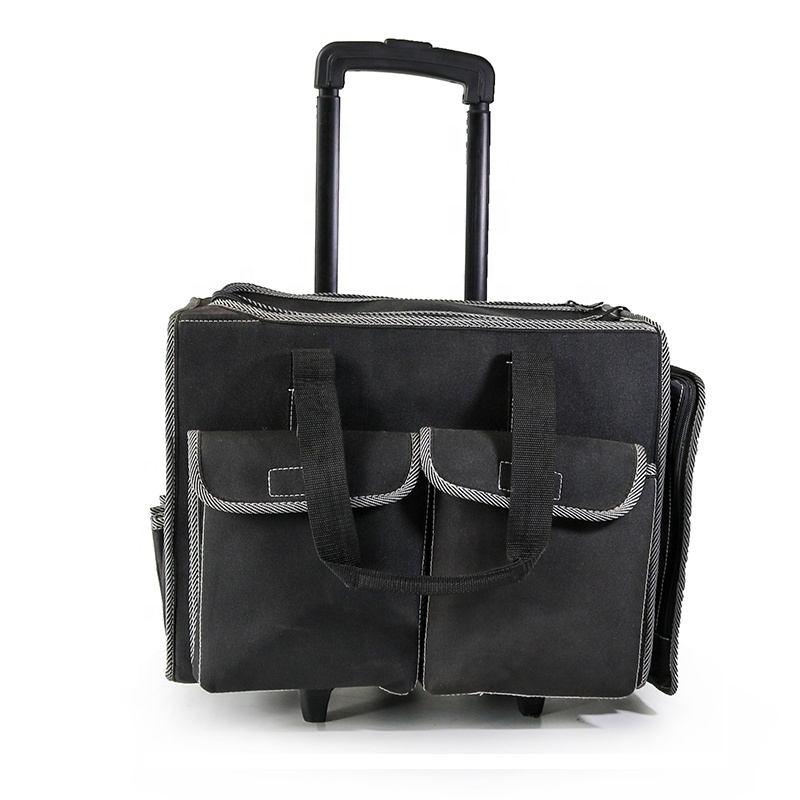Tool bag with wheels is a portable and convenient storage solution for tools and equipment. It typically features a large main compartment, multiple pockets, and a sturdy handle for pulling the bag along on its wheels.
Some popular features of tool bags with wheels include:
Tool Bag With Wheels,Tool Rucksack With Wheels,Tool Backpack With Wheels,Small Rolling Tool Bag ZHANGJIAGANG CITY XIANGLE TOOL CO., LTD. , https://www.xiangletoolbag.com

Why Copper is Used to Make Electrical Wires?
For nearly two centuries, copper has been the go-to material for electrical wiring, and for good reason. Ever since the telegraph and electromagnet were invented in the 1800s, copper's popularity skyrocketed, especially after the introduction of the telephone in 1876. Today, it plays a vital role in countless technologies and applications, from power cables and kitchen appliances to computers and tools. You're likely already familiar with copper being used to make electric wires.
Let's explore what makes copper the top choice for electrical wiring. Keep reading to discover more.
Copper is Affordable
If you're looking for value, copper delivers. While metals like silver and gold offer excellent conductivity, they're prohibitively expensive for most practical purposes. Copper, however, provides superior conductivity compared to gold but at a fraction of the cost. This affordability makes it a favorite among manufacturers. Copper is also easy to work with during production, requiring minimal effort to solidify into various shapes.
Copper is Highly Ductile
Not only is copper cost-effective, but it's also incredibly flexible. Its ductility allows it to be bent and twisted without breaking, making it ideal for threading through tight spaces like floors, walls, or ceilings. This flexibility ensures that wiring remains intact even in challenging installations. Plus, copper retains its strength regardless of how much it's bent, ensuring reliable performance over time.
Thermal Resistance is Key
One standout advantage of copper wiring is its thermal resistance. For instance, between 2015 and 2019, electrical wires caused about 614 property fires annually in Canada. However, as more homes transitioned from aluminum to copper wiring, fire risks began to decline. Copper's ability to withstand high temperatures prevents overheating and extends the lifespan of electrical wiring. As electric currents flow, they generate heat, which can damage wiring. But copper handles these temperature fluctuations gracefully, keeping your wiring safe and functional.
Exceptional Electrical Conductivity
Like other metals, copper conducts electricity. What sets it apart is its efficiency. Copper's electron arrangement facilitates smooth movement, allowing electricity to pass through wires effortlessly. This ensures efficient energy transfer, making copper the ideal choice for wiring.
Corrosion Resistance
Copper boasts impressive resistance to corrosion thanks to a natural protective layer that forms on its surface. While this layer usually protects the wiring, regular inspections are advisable to ensure everything remains intact. Copper's corrosion resistance makes it suitable for diverse environments, including industrial, rural, and marine settings. To source premium copper electrical wires, consider products from **KEI Industries**.
The "Gold Standard"
Copper is often regarded as the benchmark for electrical wiring due to its reliability and versatility. It's widely used in residential and commercial settings because of its robust conductivity and ductility. Universally compatible, copper fits seamlessly into modern homes and buildings worldwide.
Abundant Availability
Copper is plentiful, meaning it's readily available and relatively inexpensive. Geological surveys indicate vast reserves beneath Earth's surface. This abundance contributes to copper's affordability, making it a sustainable choice for long-term wiring solutions. Unlike aluminum, copper offers peace of mind with reliable performance over many years.
---
**KEI Industries: A Leader in Copper Electrical Wire Manufacturing**
Now you understand why copper remains the top pick for electrical wiring. It's efficient, safe, budget-friendly, and abundant enough to meet current and future demands. Whether for your home or a commercial space, choose copper wires from **KEI Industries** for optimal results. Established in 1968, **Krishna Electrical Industries**, or KEI, has grown into a global brand with over 5,000 channel partners worldwide. They specialize in producing a wide range of electrical wires and cables. For detailed insights into their offerings, visit their website or email them directly for personalized inquiries.